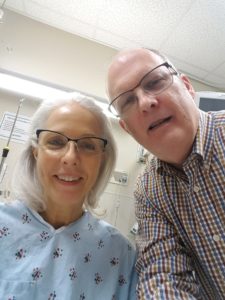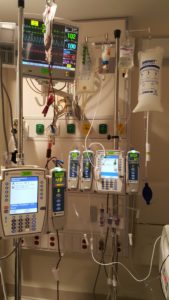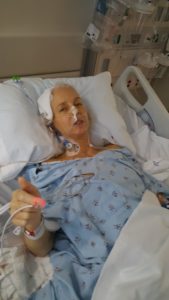Getting on the list, waiting for the call and having the surgery are easy compared to recovery. I wasn’t prepared for how difficult the first week after surgery would be, and there’s really no way to prepare mentally for it. Nobody can predict how it will unfold. Doctors will tell you semi-helpful things like “you might come out of surgery with a tube in your throat to help you breathe; we’ll give you medication to keep you comfortable, etc.” Sounds simple enough, even comforting. How scary can it be? You’ll note how calm I look 1 hour before being wheeled into surgery:

1 hour before surgery
What they DON’T tell you is waking up on a ventilator is scary – like Silence of the Lambs scary. It’s also not pretty, as evidenced by the photos below. My biggest fear about the entire transplant process was being in a medically induced coma, so you can imagine how nightmarish it was to wake up that way.


Once my brain was partially awake, I attempted to ask for help and was not able to speak. I also couldn’t move or sit up and didn’t understand why. My super helpful mind wondered if I had suffered a stroke. I desperately wanted to tell someone (anyone) that I was dying of thirst, my throat hurt on a level I didn’t know existed, I felt like I was choking AND suffocating at the same time and I was burning up! So much for that medication to “keep me comfortable.”
I’m frantically trying to communicate my level of distress while everyone around the bed is smiling, touching my arm or forehead and telling me to stay awake and to breathe. I learn that if I can stay awake for 30 consecutive minutes, the tube will be removed. However, my mind is screaming “I can’t breathe! I’m choking! Help, Help!”
As I attempted to speak, I realized there was a hard, plastic bite block in my mouth, so I tried to pull it out. I discovered, to my horror, that I couldn’t bring my hands to my face because they were restrained. I can’t tell you the level of fear that engenders. It’s like every nightmare I’ve ever had rolled into one experience.
Fortunately for me, my mother figured out I was hot (she could see I was trying to fan my hands). I didn’t know it at the time, but the intravenous Prednisone had induced thermonuclear hot flashes (think of it as Napalm pumped directly into your veins). Mercifully, my mom and the nurse removed the fabulous “Jiffy Pop” surgical hat, put a cool, damp rag on my head and pulled the covers down. Sometime after that, I motioned with my hand that I wanted to write.
I was eventually given paper and pen and felt jubilant! Finally! I’d be able to communicate. Well, kinda. My first few attempts were a little wonky. Nonsensically, I was writing words out of order and would fall back asleep after scribbling a few characters. My husband said it looked like Sanskrit, written Hebrew-style, right to left. Once I was home, my husband and I were talking about it and he said “oh, you were writing, but nothing you wrote made sense” And being the good man that he is, he saved the sheets so I could see them. I clearly struggled with spelling, but did attempt to use apostrophes. My 9th grade English teacher would be so proud of me.

I eventually got off the ventilator after successfully “breathing on my own” for 30 minutes. But let me tell you, there is nothing – and I do mean nothing – scarier than having the automatic function of the ventilator switched off and being told you have to breathe on your own (while you are restrained and unable to speak). This is what complete relief and unbelievable joy look like immediately following a coma:


However, that relief was short lived because I had to get up and sit in a chair 4 and half hours after the tube came out. I can confidently assert this is the most uncomfortable I’ve ever been in my entire life:

Stay tuned for part 2! As always, thanks for walking this journey with me.
All Hail the Queen
